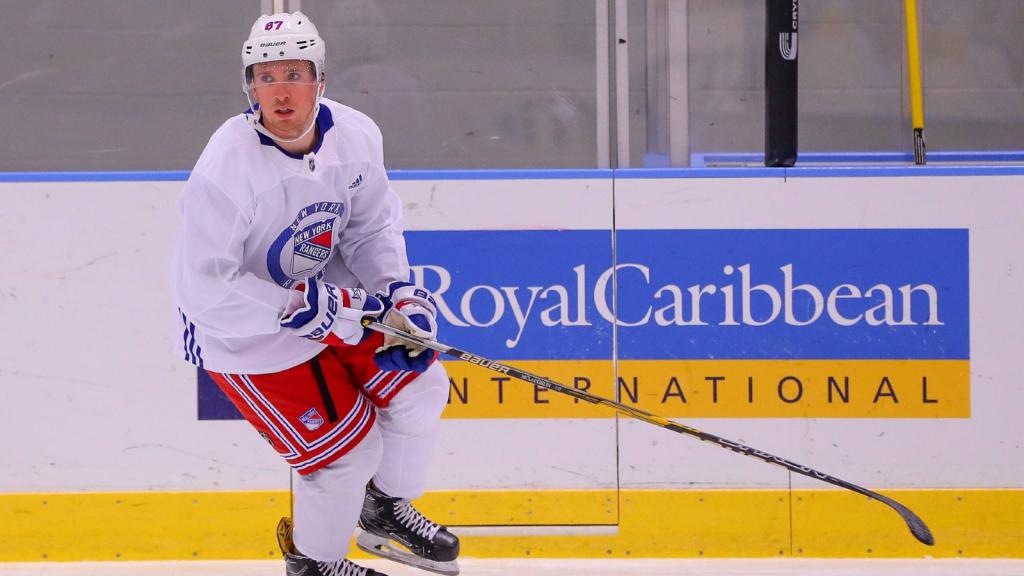Who is going to stop Russia’s All-Star studs at the Olympics?
The National Hockey League isn’t participating at the Olympics in Pyeongchang next month, but that doesn’t mean there won’t be NHL-calibre talent at the tournament. That said, it seems just about all of that talent will be concentrated to one roster.
Russia — or, well, Olympic Athletes from Russia, as they’re going to be known as due to to the Russian doping controversy — is sending far and away the most talented roster to the Games with a team highlighted by former NHL superstars Ilya Kovalchuk and Pavel Datsyuk.
They’re clearly the team to beat at this tournament. Can anybody beat Russia? Or is the ‘OAR’ going to breeze its way to the country’s first Olympic Gold in Men’s Hockey since the collapse of the Soviet Union?
The Olympic Athlete from Russia’s roster…
Though it was rumoured that Russians in the NHL like Alexander Ovechkin and Evgeni Malkin would leave their respective teams in North America to represent their country at the Olympics, it never happened. Many players voiced displeasure with the league’s choice to not participate in the Olympics, but nobody took the step and left their professional club.
As a result, Russia’s roster is entirely drawn from players in the Kontinental Hockey League. Well, from two KHL teams, really. Russia is essentially merging SKA St. Petersburg and CSKA Moscow, the two top teams in the league into a KHL All-Star team. Only two players on the team, forward Sergei Mozyakin and goaltender Vasili Koshechkin, play for a team other than CSKA or SKA. They both play for Metallurg Magnitogorsk. While other nations are drawing from around the world, Russia will have the benefit of having essentially two groups of players who play together on club teams.
Russia will have the KHL’s top two scorers, Kovalchuk and Nikita Gusev, along with teammate Pavel Datsyuk, a surefire future Hall of Famer. Another key addition to the team will be Vadim Shipachyov, who signed a three-year contract to join the Vegas Golden Knights in their inaugural season, but ultimately returned to the KHL a few weeks into the season due to a diminished role on the team.
On the blueline, the team will be led by former Los Angeles Kings defenceman Slava Voynov and former Tampa Bay Lightning defenceman Nikita Nesterov, both of whom are top defenders on SKA and CKSA respectively. In net, Russia will have Ilya Sorokin, Igor Shestyorkin, and Koshechkin to choose from. All three goalies have a save percentage of at least .930 in the KHL this season.
Is there anybody who compares?
Team Canada, the two-time defending Olympic champions, are kind of an “Oh yeah, that guy!” roster of random NHL players from the past decade. In the context of this tournament, they certainly aren’t a team of slouches, though. They’ll have Linden Vey and Andrew Ebbett, who are top-five in KHL and NLA scoring as of right now. There’s also a lot of depth on this roster, as just about everyone has some NHL experience and all are currently solid players on European teams.
The United States is much like Canada in that it features a handful of former NHLers, but they lack the depth that their neighbours from the north boast. Mark Arcobello, a former NHL player, is probably their best offensive weapon, while they only have two former NHL stars in Brian Gionta and James Wisniewski. They don’t have a single player in the Top 50 in KHL scoring.
Sweden will be a very interesting team to watch largely because they’re bringing hockey’s most exciting prospect to South Korea. Rasmus Dahlin, after an excellent showing at the World Juniors, will represent Sweden at the Olympic Games. Key players on Sweden will be former NHLers Linus Omark, who ranks fifth in KHL scoring, and Viktor Stålberg, who ranks third in NLA scoring.
Like Sweden, Finland will be an interesting team to watch because of the young players they’re bringing along. Finland will have 18-year-olds and 2017 NHL first-round picks Miro Heiskanen and Eeli Tolvanen representing the country, but the team lacks former NHL depth. Teemu Hartikainen is likely the team’s best offensive weapon, as he ranks 17th in KHL scoring.
Conclusion
I really have a difficult time seeing anybody taking down Russia at this tournament. Canada is probably the best bet because they boast a roster loaded with formers NHLers who are having strong seasons in Europe, but they don’t have the star-power or familiarity that the Russian team has. I don’t think there’ll be a line in the tournament that has the talent and chemistry that Kovalchuk, Datsyuk, and Gusev have, and even beyond them, Russia will have waves of solid players.
After a massive disappointment in which Alex Ovechkin and Co. bowed out in the quarterfinals in front of their home crowd in Sochi in 2014, this seems likely to be the year Russia comes through on the biggest international stage. Unfortunately for them, it won’t technically be as Russia, and the stage will always be remembered with an asterisk.
We can now confirm who has made the senior Russian men's national team roster for the 2018 Olympic Games!
Good luck to all of our players! #TeamRussia pic.twitter.com/Nnj9aKbZKR
— Russia Hockey (@russiahockey_en) January 25, 2018

